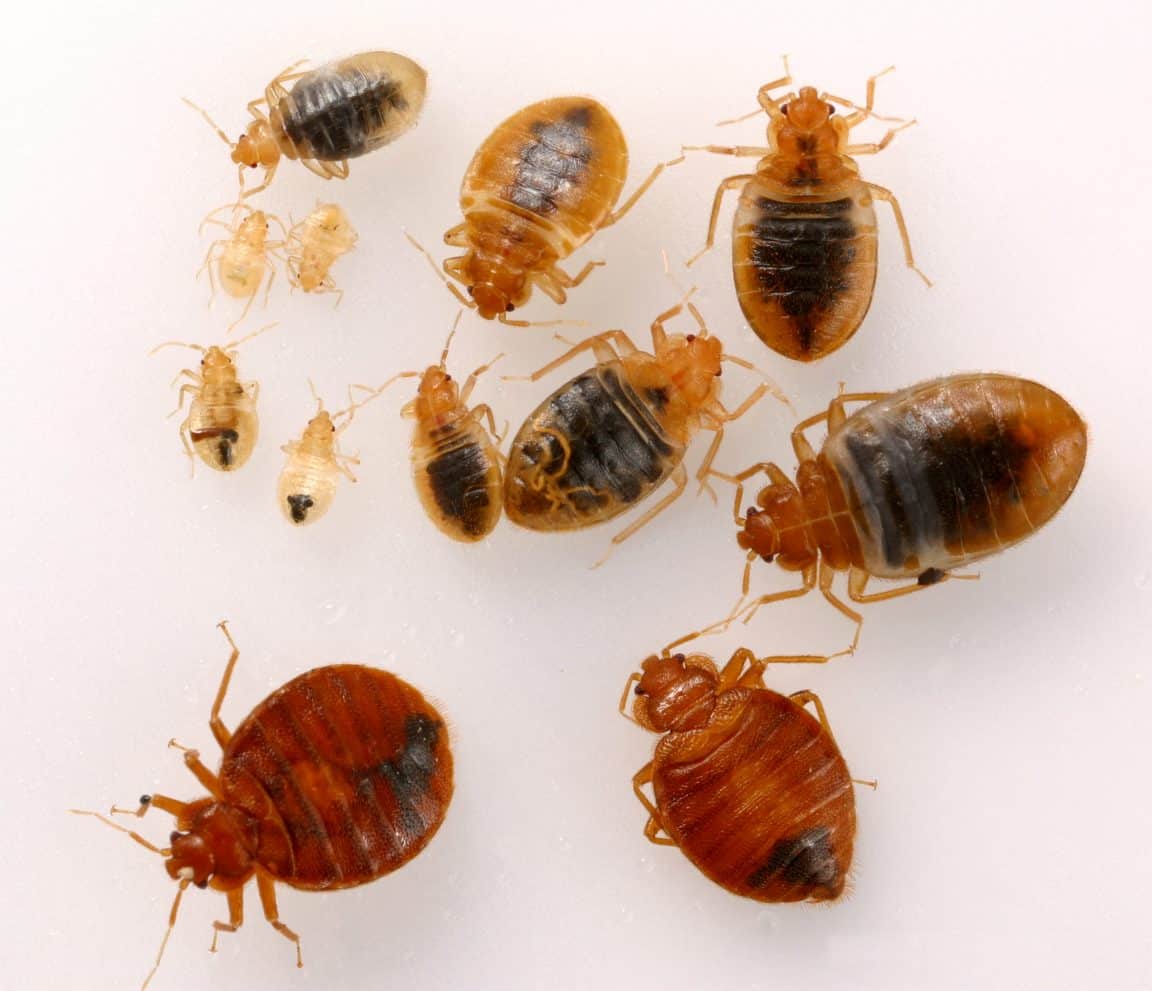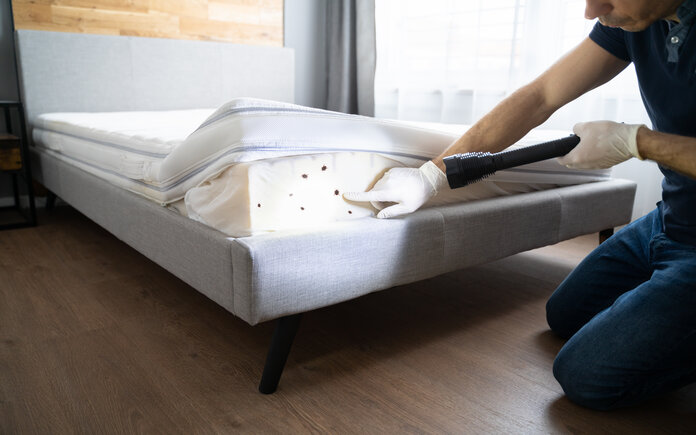Boric acid is a chemical insecticide included in pesticide products to give them enhanced killing power against insects. It’s usually mixed with baits, granules, gels, and powders to attract and kill target pests that ingest it.
This article breaks down boric acid’s composition, how it works on bugs, and whether it can kill bed bugs and their eggs. I also explore alternatives to boric acid when dealing with a bed bug infestation.
4.6
Over 90 years of experience
Nationwide service area
Free retreatments if pests return
4.7
Treats 20 types of pests
Offers instant online quotes
30-day money-back guarantee
What Is Boric Acid and How Does It Work?
Boric acid is a chemical compound made from boron. When included in insecticides, it gives the product an extra kick to kill bugs. Boric acid combines with sugars, proteins, and other attractants that lure in the target insects. When the bugs eat the bait, they also consume the toxic boric acid.
The boric acid is stomach poison for bugs, interfering with the insect’s metabolism. It causes the bug to dry out and die. Bugs must eat the bait with the boric acid for the treatment to work, which is why treatments contain sugars, proteins, and gels.
That kind of bait works well against household pests like ants, cockroaches, silverfish, and other bugs that can’t resist sugar-rich foods. However, boric acid doesn’t work as well in eliminating bed bugs.
Does Boric Acid Kill Bed Bugs Effectively?
Boric acid alone is not an effective way to kill bed bugs or their eggs. There are a couple of reasons for this:
First, bed bugs feed on blood. They aren’t attracted to sugar or protein-rich foods that contain boric acid. This specialized feeding behavior makes them unlikely to eat boric acid baits.
So, it’s difficult to get them to ingest any boric acid through baiting tactics.
Second, bugs must ingest boric acid. It has no residual killing effects on bed bugs.
So while boric acid kills other household pests, it falls short with bed bugs. No scientific studies confirm boric acid as an effective bed bug killer.
Two DIY alternatives to fight bed bugs are bleach and Lysol, but often they underperform. I recommend sticking with over-the-counter insecticides for DIY pest control. You can also try essential oils or silica gels, which have shown they work against pests like bed bugs.
Alternative Pesticides That Work on Bed Bugs
Powerful pesticides and insecticides that eliminate bed bugs include:
- Pyrethroids: Pyrethroid-based sprays and foggers kill bed bugs on contact. The CDC recommends products with pyrethroids like deltamethrin, lambda-cyhalothrin, and permethrin.
- Desiccant dusts: Silica gel and diatomaceous earth dusts can cut through the outer shells of bed bugs, leading to dehydration and death. As the bugs move around, they spread the dust to others.
- Insect growth regulators (IGRs): IGRs like hydroprene don’t directly kill bed bugs, but rather prevent baby bed bugs from maturing into adults. This breaks the reproductive cycle.
- Professional treatments: Pest control pros have access to stronger commercial-grade pesticides, insecticides, and fumigants that they can apply to infested areas. This combination treatment is the most effective way to eliminate severe infestations.
An integrated pest management (IPM) approach combines several methods for the best results.
Two examples are heating treatments — or freezing them using cryonite or carbon dioxide. Other combinations include using traps and monitors to isolate and contain clusters of bed bugs and deploying encasements for mattresses and box springs. Encasements can suffocate and starve bugs.
Borax Vs. Boric Acid – What’s the Difference?
Borax and boric acid are closely related compounds that are often confused. But there are some key differences:
Borax contains sodium, while boric acid does not. The sodium makes borax more alkaline and reactive.
Borax is more acutely toxic than boric acid if ingested. It can cause nausea, vomiting, and other short-term symptoms.
Borax looks like a fine white powder similar to salt. Boric acid is also a powder but appears more glassy or crystalline.
In pest control, borax and boric acid work in much the same way. But borax also has applications for laundry whitening, cleaning, and more.
Use Alternate Treatment Methods for Bed Bugs
Boric acid alone has no measurable effect against bed bug infestations. This common household pesticide simply isn’t formulated to kill bed bugs. Even borax powder, despite being more toxic, won’t work well against these pests.
I recommend consulting a professional exterminator as a first step if you suspect a bed bug problem in your home. Bed bugs often spread quickly and can be difficult to fully eliminate on your own. After an inspection confirms bed bugs, you can discuss treatment plans with the exterminator. This may include targeted applications of stronger pesticides, fumigation, heat or freezing methods, traps, and more.
You may also want to use mattress encasements right away to isolate your bed and prevent the bugs from multiplying in your sleep area.
But steer clear of attempting to use boric acid or borax powders to control bed bugs. While these can work well against other household pests, they simply aren’t potent or formulated in the right way to kill bed bugs effectively.
Stick to treatment methods that are proven to succeed against these challenging infestations. Read more about treating bed bugs yourself in our in-depth guide on how to get rid of bed bugs.
FAQs About Boric Acid for Bed Bugs
Does boric acid kill bed bug eggs?
No, boric acid does not kill bed bug eggs. Because bed bugs won’t eat boric acid bait, their eggs won’t ingest any, either. Boric acid has no residual effects and must be eaten to work. Eggs and newly hatched bed bugs won’t come into contact with enough boric acid to die off.
Does boric acid actually kill bed bugs?
Yes, boric acid can kill bed bugs, but it is typically not the most effective or fastest solution for eliminating a bed bug infestation. Boric acid is most effective against cockroaches.
How does boric acid work against bed bugs?
Boric acid is a desiccant, meaning it dehydrates insects by damaging their exoskeletons. When bed bugs come into contact with boric acid, it can eventually lead to their death.
Is boric acid a safe and non-toxic option for bed bug control?
Boric acid is generally considered low in toxicity to humans and pets when used correctly. However, it should be used with caution and kept out of reach of children and animals.
Are there more effective methods for getting rid of bed bugs?
Yes, professional pest control, heat treatment, and specific bed bug pesticides are often more effective and quicker at eliminating bed bug infestations than boric acid.
When might boric acid be a useful part of a bed bug control strategy?
Boric acid can be a supplementary option for low-level bed bug problems, but it is not typically recommended for severe infestations. It’s best used in conjunction with other proven methods or as a preventive measure in certain situations.














